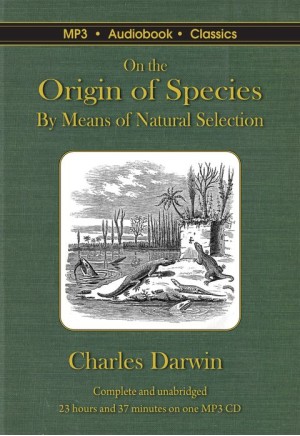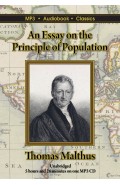| Track | Section | Length |
| 01 | 00 - A Historical Sketch and Introduction | 44:41 |
| 02 | 01 - Chapter 1 Part 1 - Variation Under Domestication | 57:04 |
| 03 | 02 - Chapter 1 Part 2 - Variation Under Domestication (continued) | 35:10 |
| 04 | 03 - Chapter 2 - Variation Under Nature | 52:18 |
| 05 | 04 - Chapter 3 - Struggle For Existence | 45:55 |
| 06 | 05 - Chapter 4 Part 1 - Natural Selection or The Survival of the Fittest | 1:02:30 |
| 07 | 06 - Chapter 4 Part 2 - Natural Selection. (continued) | 1:01:25 |
| 08 | 07 - Chapter 4 Part 3 - Natural Selection. (conclusion) | 28:20 |
| 09 | 08 - Chapter 5 Part 1 - Laws of Variation | 1:04:21 |
| 10 | 09 - Chapter 5 Part 2 - Laws Of Variation. (continued) | 26:23 |
| 11 | 10 - Chapter 6 Part 1 - Difficulties of the Theory | 1:11:04 |
| 12 | 11 - Chapter 6 Part 2 - Difficulties of the Theory (continued) | 45:26 |
| 13 | 12 - Chapter 7 Part 1 - Miscellaneous Objections to the Theory of Natural Selection | 1:10:24 |
| 14 | 13 - Chapter 7 Part 2 - Miscellaneous Objections (continued) | 55:03 |
| 15 | 14 - Chapter 8 Part 1 - Instinct | 1:02:23 |
| 16 | 15 - Chapter 8 Part 2 - Instinct (continued) | 24:24 |
| 17 | 16 - Chapter 9 Part 1 - Hybridism | 56:11 |
| 18 | 17 - Chapter 9 Part 2 - Hybridism (continued) | 37:17 |
| 19 | 18 - Chapter 10 Part 1 - On the Imperfection of the Geological Record | 1:00:02 |
| 20 | 19 - Chapter 10 Part 2 - On The Imperfection of the Geological Record (continued) | 25:45 |
| 21 | 20 - Chapter 11 Part 1 - On the Geological Succession of Organic Beings | 1:08:34 |
| 22 | 21 - Chapter 11 Part 2 - On the Geological Succession (continued) | 16:04 |
| 23 | 22 - Chapter 12 Part 1 - Geological Distribution | 59:46 |
| 24 | 23 - Chapter 12 Part 2 - Geological Distribution (continued) | 21:23 |
| 25 | 24 - Chapter 13 - Geological Distribution Continued | 1:04:14 |
| 26 | 25 - Chapter 14 Part 1 - Mutual Affinities of Organic Beings | 59:26 |
| 27 | 26 - Chapter 14 Part 2 - Mutual Affinities of Organic Beings (continued) | 1:08:12 |
| 28 | 27 - Chapter 15 Part 1 - Recapitulation and Conclusion | 56:25 |
| 29 | 28 - Chapter 15 Part 2 - Recapitulation and Conclusion (continued) | 23:43 |
Notes
Running time: 23 hours and 44 minutes
Read by: Michael Armenta
Book Coordinator: Michael Armenta
Meta Coordinator: Availle
Proof Reader: KHand
Artwork
Cover: Historical reconstruction of the Lower Pennsylvanian biota of coal swamps of North America. From Air-Breathers of the Coal Period: A Descriptive Account of the Remains of Land Animals Found in the Coal Formation of Nova Scotia with Remarks on their Bearing on Theories of the Formation of Coal and of the Origin of Species. Dawson Brothers, Montreal, 81 p
Inset: The HMS Beagle
Inset: Charles Darwin,1868, from Colin Ford's Julia Margaret Cameron: 19th Century Photographer of Genius.
Recordings
These recordings were made using the author’s original published work, which is in the public domain. The readings were recorded by members and volunteers of Librivox.org, which has generously made the recordings available to the public domain. The audio files have been lightly edited and have been engineered using professional audio tools for maximum sonic quality. While Librivox condones the sale and distribution of these recordings, it is not associated with the management or operations of MP3 Audiobook Classics.
- Download and read the eBook online at Gutenberg.org
- Download a PDF datasheet
The Origin of Species (1859) by Charles Darwin laid the foundation for the science of evolutionary biology that revolutionized our understanding of nature and mankind’s place within it. Published in 1859, the original title was On the Origin of Species by Means of Natural Selection, or the Preservation of Favoured Races in the Struggle for Life and was abbreviated for the sixth edition in 1872. The central premise is that the diversity of life results from a branching pattern of evolution from a common source and that populations change over the generations to adapt to changing circumstances through natural selection. Various notions of “transmutation” had been proposed prior to publication and were considered controversial, as they stood in opposition to the long held belief that the diversity of life was the product of an unchanging design and that humans were distinct from all other species. Darwin was an established scientist, and the work, which was written for the general reader, included exhaustive documentation from decades of research and analyzed the theory from philosophical and religious perspectives as well as scientific. As such, it was taken seriously, gained widespread interest, and helped the campaign to secularize science. During the late nineteenth century the notion of evolution became generally accepted, but it wasn’t until the mid twentieth century that the significance of natural selection was fully understood as biologists and statisticians combined Darwin’s work with Mendel’s genetic theories to arrive at the modern evolutionary synthesis. This central notion is now the unifying concept of the life sciences.
Play sample:
Download a PDF datasheet
| Item Info | |
| EAN - DVD case | 0683422134814 |
| EAN - CD jacket | 0686175924305 |
| Media | MP3 CD |
| Package | DVD box |
| Author | Charles Darwin (1809 - 1882) |
| Year | 1859 |
| Recording | |
| Read by | Michael Armenta |
| Length | 23 hours and 44 minutes |
| Type of Reading | Solo |
On the Origin of Species
- Author: Charles Darwin
- Product Code: DB-1086
- Availability: In Stock
-
$13.99
Available Options
Related Products
An Essay on the Principle of Population
An Essay on the Principle of Population, first published in 1798, is considered the most influential..
$9.99








